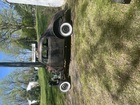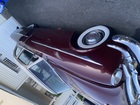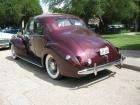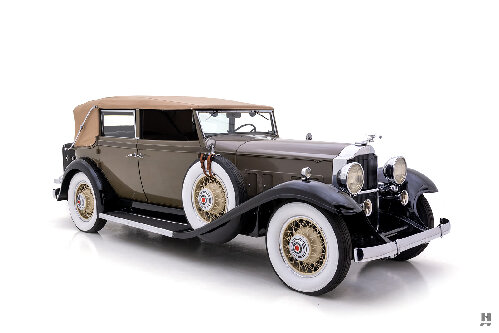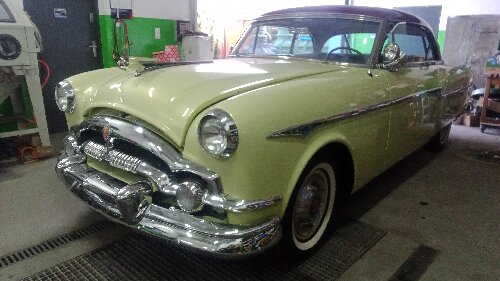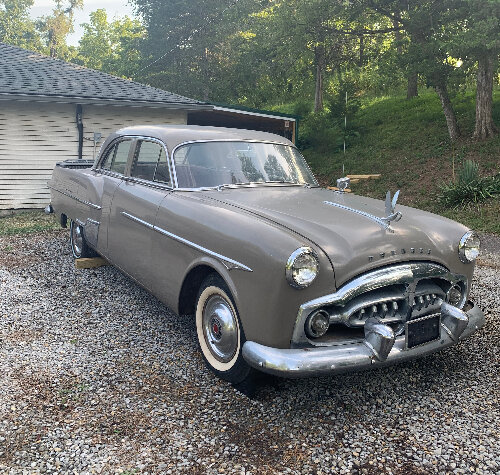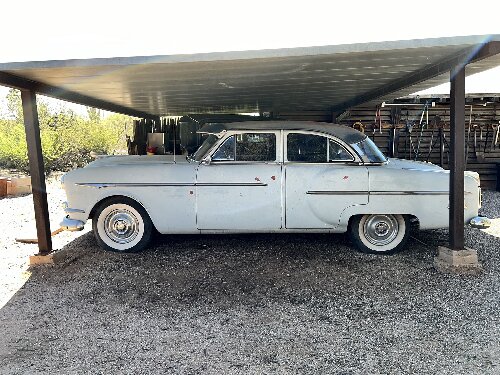|
Re: Romney's selective memory
|
||||
|---|---|---|---|---|
|
Forum Ambassador

|
Thanks for your thoughts. BTW it's primadonna.
Posted on: 2015/8/20 17:13
|
|||
|
||||
|
Re: Romney's selective memory
|
||||
|---|---|---|---|---|
|
Home away from home

|
Quote:
There is plenty of confirmation and exposition on the Mason so-called "grand plan" as well as inside info, how and when J.J. Nance was involved. A very lucid and detailed account of the whole enchilada is included in Robert Neal's book, "Packard 1951 to 1954." By the way, the Hudson plant was just a short way down the street from the Briggs/New Packard Plant on Conner Avenue in Detroit. And... I don't believe this has ever hit print before, but a former Packard exec that my aunt worked for told me that some V-8 Packards that had "assembly issues" were actually hustled down the road to a building on the Hudson site where these cars were..."remedied."
Posted on: 2015/8/20 22:46
|
|||
|
||||
|
Re: Romney's selective memory
|
||||
|---|---|---|---|---|
|
Home away from home

|
QUote from post #1 above:
" Then he cried about Packard trying to buy the Briggs plant, which he called a "stamping plant", instead of buying stampings from AMC, when the facts were Packard needed a full body plant, no" Someone correct me if i am wrong but Hudson bought stampings from Briggs. Hudson did not have it's own stamping. AMC had only stampings in Milwaukee (not Kenosha) and trucked the bodies in white to Kenosha. So Not likely Packard would want such a distant stamping plant. Romney only wanted Packard for their dealer network. Again, i am under the impression that Packard had an excellent dealer network. Nash/AMC NEVER had a dealer network worth a shit. Dealers too far apprt and too few with the exception of a few regional areas. Here in the South there was scarcely an AMC dealer. Ditto for Hudson. The only reason AMC wanted Jeep was for Gov't contracts. Note that AMC was another (later) Chrysler type operation. i.e. a bad case of corporate incest. Predominantly Mormons at the top levels of management. Williard T Marriot (of Marriot hotel fame) was one of the MAJOR players/ stock holders of AMC. Basically, AMC, at least in the post war era was little more than just a paycheck clearinghouse or kind of a "front" for family/religous affiliate members thru political contracts etc. Without the Gov't contracts (Jeep and AM-General , buses, military tacticle vehicles etc) the company would have never survived 1958 on cars alone.
Posted on: 2015/8/20 23:05
|
|||
|
VAPOR LOCK demystified: See paragraph SEVEN of PMCC documentaion as listed in post #11 of the following thread:f
https://packardinfo.com/xoops/html/modules/newbb/viewtopic.php?topic_id=7245 |
||||
|
||||
|
Re: Romney's selective memory
|
||||
|---|---|---|---|---|
|
Home away from home

|
Quote:
Thanks!
Posted on: 2015/8/20 23:30
|
|||
|
||||
|
Re: Romney's selective memory
|
||||
|---|---|---|---|---|
|
Home away from home

|
A very lucid and detailed account of the whole enchilada is included in Robert Neal's book, "Packard 1951 to 1954."
Looks like that volume needs to be on my reading list for this winter. Found a book about Nash that I have not read either, so I'll have plenty to keep my attention diverted from the wind, snow and subzero temps.
Posted on: 2015/8/20 23:32
|
|||
|
||||
|
Re: Romney's selective memory
|
||||
|---|---|---|---|---|
|
Home away from home

|
Someone correct me if i am wrong but Hudson bought stampings from Briggs. Hudson did not have it's own stamping.
Hudson produced a composite drawing of all it's plants, made to look like they were all together around the assembly plant. The caption for the body plant reads: "Monobuilt body-and-frame, fenders and sheet metal manufacturing, finishing, painting." Accounts say that when Cadillac bought the plant, they used it as a stamping plant. <i>AMC had only stampings in Milwaukee (not Kenosha) and trucked the bodies in white to Kenosha. </i> AMC was still shipping bodies from Milwaukee in 75 when I visited Kenosha assembly. The Milwaukee body plant, and one in Racine, had been acquired by Charles Nash around the same time he bought the Kenosha plant. In the interview, Romney said they had just built a stamping plant in Kenosha. He could be referring to the lakeside plant, a former Sealy mattress and furniture plant that Mason bought in 52. Sticks in my mind that, when I toured the plant, the guide said some bodies were made in Kenosha, so there may have been some presses in the Lakeside plant. <i>So Not likely Packard would want such a distant stamping plant.</i> Shipping stampings is not nearly as expensive as shipping semi-finished bodies. Kalamazoo, MI used to have a GM stamping plant, when there were no assembly plants closer than Lansing. The bulk of Studebaker's stampings were shipped by rail from Budd. Packard's problem was it lacked the facilities to assemble and paint bodies, even if the Nash produced stampings were price competitive. <i>Romney only wanted Packard for their dealer network. </i> I recall Nance being quoted that he had the job of bringing Studebaker into the "grand plan" as Mason had not been able to come to terms with Vance and Hoffman. Studebaker was the largest of the four independents. For Mason to do an asset strip on Studebaker, take the V8, the dealers and legacy parts business, then kill Studebaker, he would have needed complete control. Maybe Mason could not come to terms with Studebaker management because he could not figure out how to take complete control of the larger company. An attempt at an asset strip would be blocked by the Studebaker stockholders. Studebaker had the best investment bankers in the business on it's side as both Goldman and Lehman Brothers has been major stockholders since before WWI. We saw that demonstrated when Studebaker, on the brink of collapse, outmaneuvered Packard and had the merger valuations based on book value, rather than market cap, which gave Studebaker interests 55% of the vote at S-P.
Posted on: 2015/8/21 0:15
|
|||
|
||||
|
Re: Romney's selective memory
|
||||
|---|---|---|---|---|
|
Home away from home

|
One thing to keep in mind is that most of us Packard people are obsessive about the history of the company. A person being interviewed is looking at questions from another perspective years after the fact. Their memory of events I am sure would be different from our understanding of events. I talked with Governor Romney about the proposed merger and he stated that when Mr. Mason died so did the plan. All I am trying to say is, Governor Romney had his memories of events in the past and they may not be "selective" but just what he recalls.
Posted on: 2015/8/21 11:18
|
|||
|
||||
|
Re: Romney's selective memory
|
||||
|---|---|---|---|---|
|
Home away from home

|
If AMC was an affirmative action program for Mormons and Packard was a nest of Masons then a merger of the two would make for a great Broadway comedy show. The only thing needed to complete the situation would be if Hudson was being run by that religion that claims human beings were dumped on earth by aliens in a space ship.
Posted on: 2015/8/21 16:52
|
|||
|
||||
|
Re: Romney's selective memory
|
||||
|---|---|---|---|---|
|
Home away from home

|
Hi Steve203
That's the luxury of decades distance, selective perception and memory, plus a healthy dollop of sanitizing by the interviewee of his roll and responsibilities for various outcomes. Interesting that well removed from the events, Romney still felt compelled to justify some of his actions. He conspicuously mentions Nance's intemperate, boastful remarks, slights which apparently still stung. One can't blame him for his animosity toward Nance. After all, Romney had been mentored in automobile business by Mason for six years; Nance was still doing his on-the-job training, receiving little sage advice from a board as confused about the evolving market as he was. Difficult to dismiss the disparagement from a neophyte. However Mason's grand plan evolved, the moment he was gone so too was it. Romney's only charge was to somehow lead AMC back to profitability from its rapidly deteriorating position. His outlook and background told him there was still a segment who valued what he molded the Rambler to target. Market research for it was no more complicated than his interviewing fellow parishioners as to their automotive preferences. His hunches about smaller, compact cars turned out to be very prescient for the times. Even as much as he lamented the breaking of the 'gentleman's agreement' for reciprocity purchasing, co-operation with S-P might have been helpful but it was a very minor issue. He pressed the point to show how dishonorable Nance was to deal with. "Did Mason's "grand plan" evolve the way it did over years, or was Mason's plan a cynical dealer grab from day one?" No doubt that initially Mason was sincere in bringing about a merger of his company and all the independents when that could be done from a position of combined strength, possible until 1950 when they held nearly 13% of the total market. We know that he approached the boards of each with the proposal and was rebuffed. Given those heady, optimistic postwar years with their plants cranking out cars full tilt and profits rolling in (except at Packard) none of the other principles were prescient enough to understand that what George was telling them would soon come to pass. Or, they simply chose to hope it would last forever. By 1953, when the situation became critical, his outlook may well have become a bit jaded, willing to use mergers to salvage whatever resources the others held to bolster Nash and Rambler sales including dealer networks. The Packard dealer network was a shambles by then, little inducement. Each management still saw their company as that which should survive and prosper, none would willingly have merged if demise was the likely result. Barit even tried to extract assurances that Hudson would continue, though given its reduced state, it was a vain hope. An asset strip essentially was what it became for both; Romney acted as such immediately on Hudson, motivated to end the financial drain continued operation there would extract. We've seen how well the lack of action in that direction turned out for S-P. Ultimately C-W affected their version, helping themselves to what was useful to them, not to the benefit of Packard, barely to even Studebaker though yielding enough funds to allow it to survive, albeit fatally damaged. The eventual outcome for AMC should have been satisfaction enough for Romney, leading the remnants of two medium-priced makers onto major successes in an emergent segment which theretofore was certain failure for all who tried. Subsequent AMC troubles were after his tenure; he left them with solid finances and an updated product line which if simply built upon could have lead to further successes. "If I was sitting on the Packard board at the time, I would instinctively know that the Packard clientele would not buy a tarted up Nash,......." In spite of the ultimate loss of Packard, something to be thankfully that never came to pass, the very idea of Packard as 'tarted-up Nash" just curdles my stomach! Steve
Posted on: 2015/8/23 13:38
|
|||
|
.....epigram time.....
Proud 1953 Clipper Deluxe owner. Thinking about my next Packard, want a Clipper Deluxe Eight, manual shift with overdrive. |
||||
|
||||

